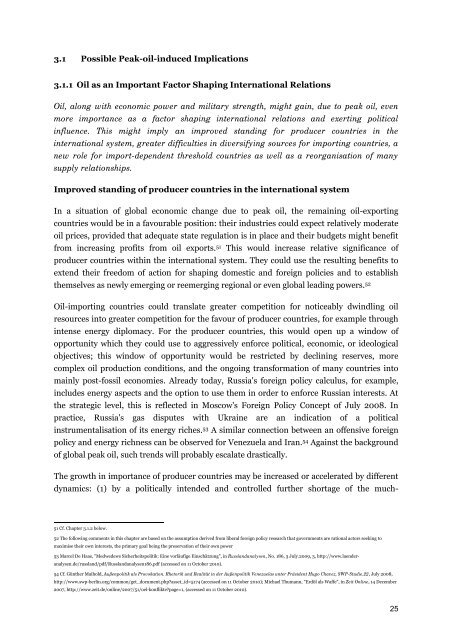PEAK OIL
PEAK OIL
PEAK OIL
Create successful ePaper yourself
Turn your PDF publications into a flip-book with our unique Google optimized e-Paper software.
3.1 Possible Peak-oil-induced Implications<br />
3.1.1 Oil as an Important Factor Shaping International Relations<br />
Oil, along with economic power and military strength, might gain, due to peak oil, even<br />
more importance as a factor shaping international relations and exerting political<br />
influence. This might imply an improved standing for producer countries in the<br />
international system, greater difficulties in diversifying sources for importing countries, a<br />
new role for import-dependent threshold countries as well as a reorganisation of many<br />
supply relationships.<br />
Improved standing of producer countries in the international system<br />
In a situation of global economic change due to peak oil, the remaining oil-exporting<br />
countries would be in a favourable position: their industries could expect relatively moderate<br />
oil prices, provided that adequate state regulation is in place and their budgets might benefit<br />
from increasing profits from oil exports. 51 This would increase relative significance of<br />
producer countries within the international system. They could use the resulting benefits to<br />
extend their freedom of action for shaping domestic and foreign policies and to establish<br />
themselves as newly emerging or reemerging regional or even global leading powers. 52<br />
Oil-importing countries could translate greater competition for noticeably dwindling oil<br />
resources into greater competition for the favour of producer countries, for example through<br />
intense energy diplomacy. For the producer countries, this would open up a window of<br />
opportunity which they could use to aggressively enforce political, economic, or ideological<br />
objectives; this window of opportunity would be restricted by declining reserves, more<br />
complex oil production conditions, and the ongoing transformation of many countries into<br />
mainly post-fossil economies. Already today, Russia's foreign policy calculus, for example,<br />
includes energy aspects and the option to use them in order to enforce Russian interests. At<br />
the strategic level, this is reflected in Moscow's Foreign Policy Concept of July 2008. In<br />
practice, Russia's gas disputes with Ukraine are an indication of a political<br />
instrumentalisation of its energy riches. 53 A similar connection between an offensive foreign<br />
policy and energy richness can be observed for Venezuela and Iran. 54 Against the background<br />
of global peak oil, such trends will probably escalate drastically.<br />
The growth in importance of producer countries may be increased or accelerated by different<br />
dynamics: (1) by a politically intended and controlled further shortage of the much-<br />
51 Cf. Chapter 3.1.2 below.<br />
52 The following comments in this chapter are based on the assumption derived from liberal foreign policy research that governments are rational actors seeking to<br />
maximise their own interests, the primary goal being the preservation of their own power<br />
53 Marcel De Haas, "Medwedews Sicherheitspolitik: Eine vorläufige Einschätzung", in Russlandanalysen, No. 186, 3 July.2009, 3, http://www.laenderanalysen.de/russland/pdf/Russlandanalysen186.pdf<br />
(accessed on 11 October 2010).<br />
54 Cf. Günther Maihold, Außenpolitik als Provokation. Rhetorik und Realität in der Außenpolitik Venezuelas unter Präsident Hugo Chavez, SWP-Studie.22, July 2008,<br />
http://www.swp-berlin.org/common/get_document.php?asset_id=5174 (accessed on 11 October 2010); Michael Thumann, "Erdöl als Waffe", in Zeit Online, 14 December<br />
2007, http://www.zeit.de/online/2007/51/oel-konflikte?page=1, (accessed on 11 October 2010).<br />
25


